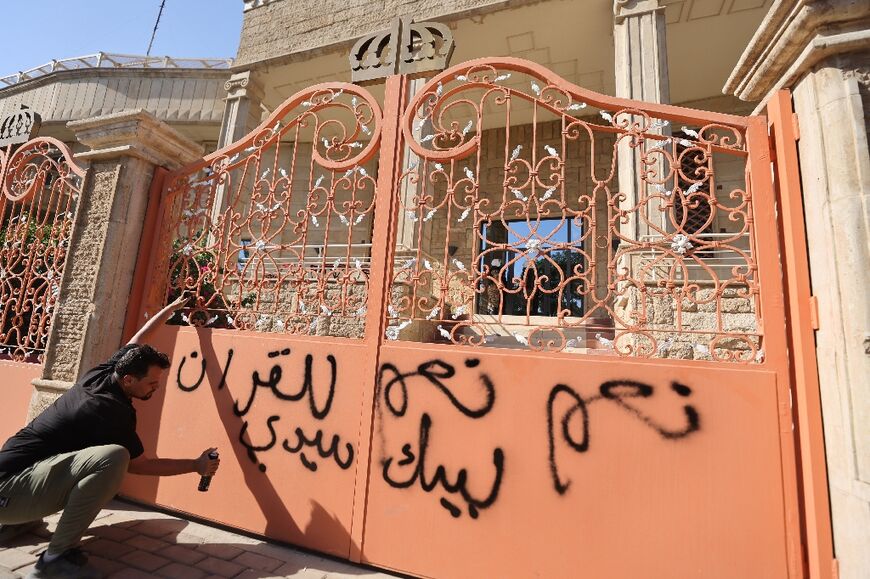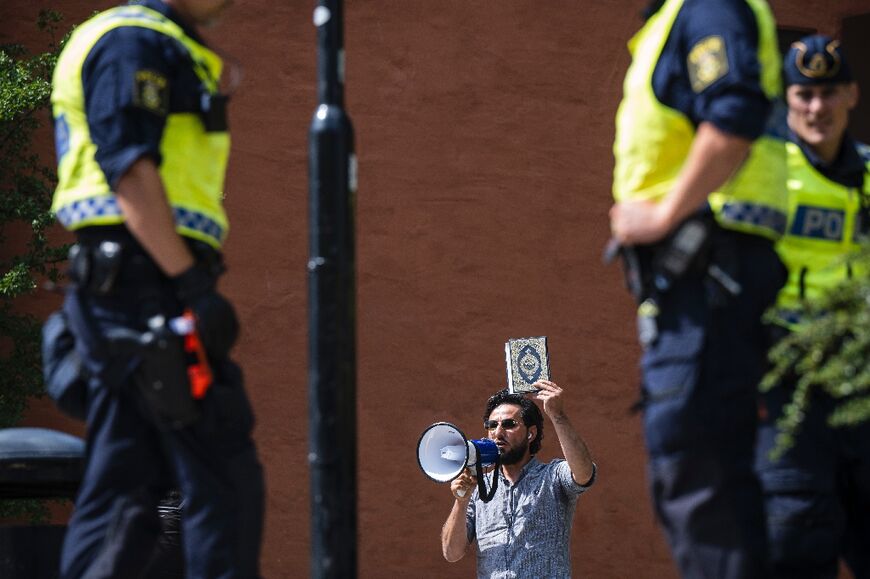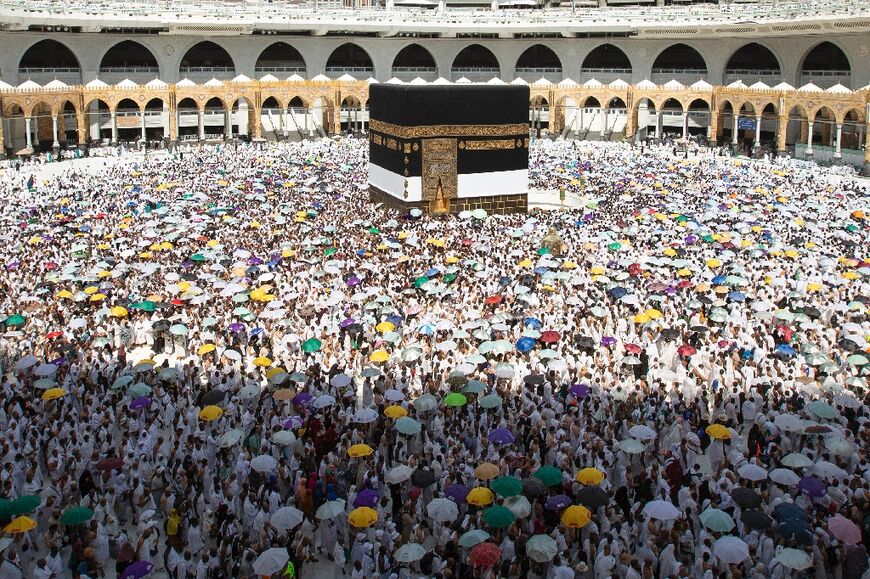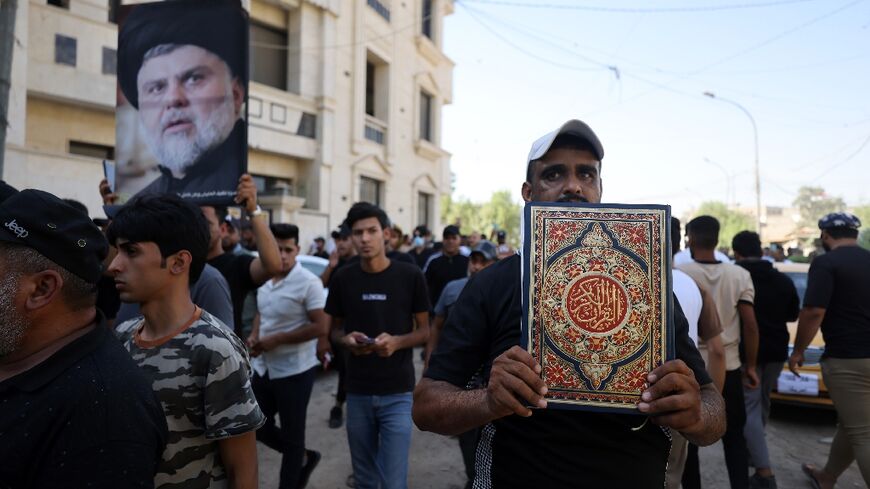Iraqi protesters breached Sweden's embassy in Baghdad on Thursday, angered by a Koran burning outside a Stockholm mosque that sparked condemnation across the Muslim world.
A crowd of supporters of firebrand Shiite cleric Moqtada Sadr stayed inside the compound for about 15 minutes, then left as security forces deployed, an AFP photographer said.
"Our constitution is the Koran," read a message on leaflets carried by the protesters, and a message sprayed on the compound's gate said "Yes, yes to the Koran".
The protest came a day after an Iraqi citizen living in Sweden, Salwan Momika, 37, stomped on the Islamic holy book and set several pages alight in front of the capital's largest mosque.
Swedish police had granted him a permit in line with free-speech protections, but authorities later said they had opened an investigation over "agitation".
"Within 10 days I will burn the Iraqi flag and the Koran in front of Iraq's embassy in Stockholm," Momika told a Swedish newspaper late Thursday.
The Koran burning, coinciding with the start of the Muslim Eid al-Adha and the end of the annual pilgrimage to Mecca in Saudi Arabia, sparked anger across and beyond the Middle East.

Iraq's foreign ministry condemned Sweden's decision to grant an "extremist" permission to burn the Koran and said such acts "inflame the feelings of Muslims around the world and represent a dangerous provocation".
Late Thursday, the Iraqi foreign ministry said it had summoned the Swedish ambassador to Baghdad to inform her of the country's "strong protest" over the authorisation decision.
US State Department spokesman Matthew Miller told reporters Washington was "deeply concerned by the act" of the Koran burning which he said could threaten religious minorities in Sweden, but supported the decision to allow the demonstration.
"Issuing the permit... is not an endorsement of the demonstration's actions," Miller said.
Saudi Arabia, which hosted around 1.8 million hajj pilgrims, denounced the Koran burning, with the foreign ministry calling it part of "hateful and repeated attacks" on Islam.
- 'Assault on faith' -
The 57-member Organisation of Islamic Cooperation said it would hold an "emergency meeting" to discuss the situation. An OIC official said the talks would most probably be held on Sunday in the Saudi Red Sea port of Jeddah.
Iran joined in the condemnation, with Foreign Minister Hossein Amir-Abdollahian saying the Koran burning was an "insult" against "religious sanctities".
"Calling these behaviours freedom and democracy only encourage terrorism and extremism," he warned in a tweet.

Turkish President Recep Tayyip Erdogan also denounced Sweden for allowing a protest, further clouding the Nordic nation's chances of quickly joining NATO.
"We will eventually teach the arrogant Westerners that insulting Muslims is not freedom of thought," Erdogan said in televised remarks.
"We will show our reaction in the strongest possible terms, until a determined victory against terrorist organisations and Islamophobia is achieved."
Egypt called the Koran burning a "disgraceful act provoking the feelings of Muslims" as they mark Eid, while the Cairo-based Arab League branded it an "assault on the core of our Islamic faith".
The United Arab Emirates foreign ministry said it had summoned the Swedish ambassador and "stressed that Sweden disregarded its international responsibilities and demonstrated a lack of respect for social values".
- Sweden 'complacent' -

Kuwait said perpetrators of "hostile acts" must be brought to justice and "prevented from using the principle of freedoms as a ploy to justify hostility against Islam or any holy faith".
Bahrain said that "insulting religions... generates hatred, extremism and violence", while Libya's foreign ministry said such action "contradicts international efforts aimed at bolstering tolerance and moderation".
In neighbouring Tunisia, the foreign ministry denounced an "odious crime" while Morocco summoned Sweden's charge d'affaires in Rabat and recalled its ambassador over "these repeated provocations, committed under the complacent gaze of the Swedish government".
The Palestinian foreign ministry denounced a "flagrant attack on human rights, values of tolerance, acceptance of others, democracy and peaceful coexistence".
Syria slammed a "disgraceful act" while the Iran-backed Hezbollah movement in neighbouring Lebanon said Swedish authorities were "complicit in the crime".
Further afield, Pakistan's foreign ministry said it "strongly condemns the despicable act", while Prime Minister Shehbaz Sharif said he was "disgusted and appalled" by the Koran burning in front of a mosque.
"I have no words to adequately condemn this anti-Islam act, which is clearly meant to hurt the feelings of Muslims around the world," Sharif said.
Afghanistan's Taliban government, which enforces a strict interpretation of Islamic law, also reacted angrily, labelling the Koran burning an act of "utter contempt towards this noble religion".
burs-dv/fz/ami/kjm/ach






